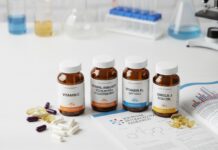Your immune system is your first line of defense against illness — and what you eat plays a powerful role in keeping it strong. Certain foods and vitamins fuel immune cells, reduce inflammation, and give your body the nutrients it needs to fight off infections.
In this guide, we’ll explore the best foods and vitamins for immunity, how they work in the body, and how you can incorporate them into your daily diet.
Related article: Ultimate Guide to Immunity Support: Natural Ways to Strengthen Your Body’s Defenses
Why Nutrition Matters for Immune Health
Every bite you eat has the potential to either weaken or strengthen your immune defenses. Nutrient-rich foods supply your body with antioxidants, vitamins, and minerals that help:
-
Support white blood cell production
-
Reduce oxidative stress
-
Balance inflammation
-
Strengthen the gut microbiome
-
Speed up recovery when you get sick
Poor diets high in sugar, processed foods, and unhealthy fats can do the opposite — weakening your immunity and leaving you more vulnerable.
Essential Vitamins and Nutrients for Immunity
1. Vitamin C – The Classic Immunity Booster
-
Role: Supports white blood cells, enhances iron absorption, acts as an antioxidant.
-
Best Foods: Citrus fruits (oranges, lemons, grapefruits), strawberries, bell peppers, kiwi, broccoli.
-
Tip: Add fresh lemon to water or enjoy a daily smoothie with berries and spinach.
2. Vitamin D – The Sunshine Vitamin
-
Role: Regulates immune cell function and reduces inflammation. Deficiency linked to higher infection risk.
-
Best Foods: Fatty fish (salmon, tuna, mackerel), fortified dairy, mushrooms, egg yolks.
-
Bonus: Just 15 minutes of sunlight daily can help boost Vitamin D naturally.
3. Zinc – The Immune Mineral
-
Role: Crucial for the development of immune cells and wound healing.
-
Best Foods: Pumpkin seeds, beans, lentils, cashews, lean beef, oysters.
-
Tip: Sprinkle pumpkin seeds on salads or oatmeal for an easy zinc boost.
4. Vitamin A – The Defender of Mucous Membranes
-
Role: Strengthens skin and mucous membranes — your body’s first line of defense.
-
Best Foods: Carrots, sweet potatoes, spinach, kale, red bell peppers, apricots.
-
Tip: Pair vitamin A-rich veggies with a healthy fat (like olive oil) to enhance absorption.
5. Vitamin E – The Antioxidant Shield
-
Role: Protects immune cells from damage caused by free radicals.
-
Best Foods: Almonds, sunflower seeds, hazelnuts, spinach, avocado.
6. Selenium – The Trace Mineral Powerhouse
-
Role: Reduces inflammation, supports immune cell activity.
-
Best Foods: Brazil nuts, tuna, turkey, chicken, eggs.
-
Tip: Just 1–2 Brazil nuts per day can meet your selenium needs.
7. Iron – Oxygen and Energy for Immunity
-
Role: Helps red blood cells carry oxygen, essential for immune function.
-
Best Foods: Red meat, chicken, lentils, spinach, tofu.
-
Tip: Pair plant-based iron sources with Vitamin C-rich foods for better absorption.
8. Probiotics – The Gut-Immune Connection
-
Role: 70% of the immune system resides in the gut. Healthy bacteria balance improves immunity.
-
Best Foods: Yogurt with live cultures, kefir, sauerkraut, kimchi, miso, kombucha.
Related article: Top Supplements for Immune Support: What Science Says
Top Immune-Boosting Foods You Should Add to Your Diet
1. Citrus Fruits
Rich in Vitamin C, they stimulate white blood cell production.
Examples: Oranges, lemons, limes, grapefruits.
2. Garlic
Contains allicin, a compound known for antimicrobial properties.
3. Ginger
Anti-inflammatory and antioxidant-rich, helps soothe sore throats and reduce inflammation.
4. Berries
Packed with Vitamin C and polyphenols that fight free radicals.
5. Leafy Greens
Spinach, kale, and Swiss chard are nutrient powerhouses full of vitamins A, C, and E.
6. Nuts and Seeds
Almonds, sunflower seeds, and pumpkin seeds provide Vitamin E, zinc, and healthy fats.
7. Green Tea
Loaded with antioxidants and amino acids like L-theanine, which boosts immune response.
8. Turmeric
Contains curcumin, a strong anti-inflammatory compound.
9. Mushrooms
Boost production of white blood cells and provide Vitamin D.
10. Yogurt and Fermented Foods
Support gut bacteria, which play a key role in immune defense.
Sample Daily Immune-Boosting Meal Plan
-
Breakfast: Greek yogurt with berries, chia seeds, and honey.
-
Snack: A handful of almonds and green tea.
-
Lunch: Grilled salmon with spinach and quinoa.
-
Snack: Carrot sticks with hummus and a citrus fruit.
-
Dinner: Lentil soup with garlic, turmeric, and leafy greens.
-
Evening: Warm chamomile or ginger tea.
Should You Use Supplements for Immunity?
Even with the best diet, it’s not always easy to get enough immune-boosting nutrients daily. Supplements can help bridge the gap — especially Vitamin D, C, zinc, and probiotics.
Related article: Top Supplements for Immune Support: What Science Says
Nutrition Tips for Special Groups
Children
-
Focus on fruits, veggies, yogurt, nuts, and whole grains.
Related article: Supporting Your Child’s Immune System
Adults
-
Balance work, nutrition, and stress. Add foods rich in antioxidants.
Seniors
-
Prioritize protein, Vitamin D, and zinc-rich foods.
Related article: How to Strengthen Immunity at Every Age
Final Thoughts
Your diet is one of the most powerful tools you have to strengthen your immune system naturally. By eating a variety of whole foods, vitamins, and probiotics, you can give your body the defense it needs year-round.
Still, even the healthiest diets sometimes fall short. That’s why many turn to supplements like ImmuneXtra.
Formulated with Vitamin C, D, zinc, probiotics, and plant-based antioxidants, ImmuneXtra is designed to give your body the daily support it needs.







